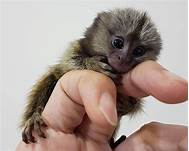What Type Of Monkey Can You Have As A Pet?
Monkeys are fascinating and intelligent animals that can make unique and entertaining companions. However, it's important to carefully consider the legality, welfare, and commitment involved before deciding on a pet monkey.

Factors to Consider Before Getting a Pet Monkey
1. Legal Issues: Laws regarding primate ownership vary widely across countries and states. In many regions, it's illegal to keep monkeys as pets. Check local laws before acquiring a monkey to avoid legal consequences.
2. Animal Welfare: Monkeys are wild animals with complex needs and behaviors. Providing them with proper housing, diet, socialization, and veterinary care is essential for their well-being.
3. Commitment: Monkeys can live for 20 to 40 years, requiring a long-term commitment to their care and well-being. Be prepared for the financial and time investment required to provide a suitable home and lifestyle for your pet monkey.
Suitable Monkey Species for Pets
Among the over 250 monkey species, only a few are considered relatively suitable for life as pets. These species are generally small to medium-sized, with social behaviors and relatively manageable temperaments. Examples include:
1. Squirrel Monkey: Squirrel monkeys are small, playful, and agile monkeys with long tails and distinctive white ear tufts. They form strong bonds with their human companions and require plenty of enrichment and social interaction.
2. Capuchin Monkey: Capuchin monkeys are intelligent and interactive monkeys with a reputation for being problem solvers. They enjoy interacting with humans and require a stimulating environment with opportunities to manipulate objects and learn new tricks.
3. Marmoset Monkey: Marmosets are tiny, delicate monkeys with big eyes and furry tails. They are social animals that live in small family groups. Marmosets require specialized diets and careful handling due to their fragile nature.
Challenges of Owning a Pet Monkey
1. Diet: Monkeys have specific dietary needs that can be challenging to fulfill. They require a variety of fruits, vegetables, insects, and occasionally small animals, depending on their species. Balancing their diet to meet their nutritional requirements can be complex.
2. Housing: Monkeys need spacious enclosures that replicate their natural habitat. This includes ample climbing structures, hiding spots, and space for movement. Providing a suitable enclosure can be costly and time-consuming.
3. Socialization: Monkeys are social animals that require regular interaction with their own kind. Keeping a single monkey can lead to loneliness and behavioral problems. Providing opportunities for socialization, either with other monkeys or human companions, is essential.
Conclusion
Owning a pet monkey is a complex and challenging endeavor that requires careful consideration, commitment, and specialized knowledge. It's essential to prioritize the welfare of the animal and ensure that you have the resources, environment, and expertise to provide proper care before bringing a monkey into your life.
Declaration: All article resources on this website, unless otherwise specified or labeled, are collected from online resources. If the content on this website infringes on the legitimate rights and interests of the original author, you can contact this website to delete it.





